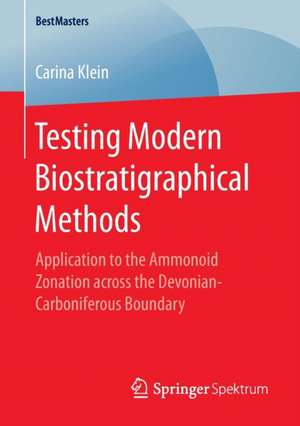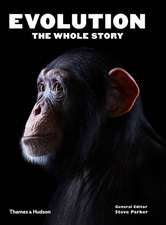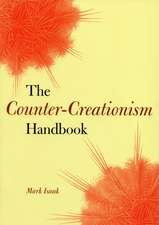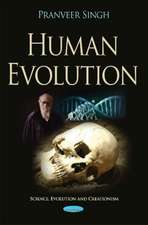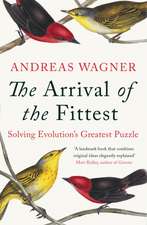Testing Modern Biostratigraphical Methods: Application to the Ammonoid Zonation across the Devonian-Carboniferous Boundary: BestMasters
Autor Carina Kleinen Limba Engleză Paperback – 18 aug 2016
Din seria BestMasters
-
 Preț: 364.13 lei
Preț: 364.13 lei - 13%
 Preț: 367.40 lei
Preț: 367.40 lei -
 Preț: 364.13 lei
Preț: 364.13 lei -
 Preț: 394.30 lei
Preț: 394.30 lei -
 Preț: 393.57 lei
Preț: 393.57 lei -
 Preț: 406.58 lei
Preț: 406.58 lei - 13%
 Preț: 366.14 lei
Preț: 366.14 lei -
 Preț: 367.04 lei
Preț: 367.04 lei -
 Preț: 391.40 lei
Preț: 391.40 lei -
 Preț: 346.23 lei
Preț: 346.23 lei - 13%
 Preț: 364.56 lei
Preț: 364.56 lei -
 Preț: 311.76 lei
Preț: 311.76 lei - 5%
 Preț: 403.95 lei
Preț: 403.95 lei - 13%
 Preț: 396.41 lei
Preț: 396.41 lei -
 Preț: 365.65 lei
Preț: 365.65 lei - 13%
 Preț: 365.82 lei
Preț: 365.82 lei - 13%
 Preț: 367.40 lei
Preț: 367.40 lei -
 Preț: 333.99 lei
Preț: 333.99 lei - 20%
 Preț: 366.22 lei
Preț: 366.22 lei - 13%
 Preț: 368.34 lei
Preț: 368.34 lei -
 Preț: 367.04 lei
Preț: 367.04 lei -
 Preț: 377.18 lei
Preț: 377.18 lei -
 Preț: 365.58 lei
Preț: 365.58 lei -
 Preț: 344.45 lei
Preț: 344.45 lei -
 Preț: 392.12 lei
Preț: 392.12 lei - 20%
 Preț: 292.10 lei
Preț: 292.10 lei -
 Preț: 404.04 lei
Preț: 404.04 lei -
 Preț: 251.33 lei
Preț: 251.33 lei -
 Preț: 393.57 lei
Preț: 393.57 lei -
 Preț: 344.87 lei
Preț: 344.87 lei -
 Preț: 410.77 lei
Preț: 410.77 lei -
 Preț: 411.75 lei
Preț: 411.75 lei -
 Preț: 379.30 lei
Preț: 379.30 lei -
 Preț: 411.32 lei
Preț: 411.32 lei -
 Preț: 412.89 lei
Preț: 412.89 lei -
 Preț: 377.73 lei
Preț: 377.73 lei -
 Preț: 378.12 lei
Preț: 378.12 lei -
 Preț: 412.51 lei
Preț: 412.51 lei -
 Preț: 481.79 lei
Preț: 481.79 lei -
 Preț: 377.18 lei
Preț: 377.18 lei -
 Preț: 480.06 lei
Preț: 480.06 lei -
 Preț: 376.04 lei
Preț: 376.04 lei -
 Preț: 382.95 lei
Preț: 382.95 lei -
 Preț: 377.95 lei
Preț: 377.95 lei -
 Preț: 412.68 lei
Preț: 412.68 lei -
 Preț: 376.80 lei
Preț: 376.80 lei -
 Preț: 380.45 lei
Preț: 380.45 lei -
 Preț: 410.17 lei
Preț: 410.17 lei -
 Preț: 410.94 lei
Preț: 410.94 lei -
 Preț: 380.63 lei
Preț: 380.63 lei
Preț: 376.59 lei
Nou
Puncte Express: 565
Preț estimativ în valută:
72.06€ • 75.43$ • 59.98£
72.06€ • 75.43$ • 59.98£
Carte tipărită la comandă
Livrare economică 31 martie-14 aprilie
Preluare comenzi: 021 569.72.76
Specificații
ISBN-13: 9783658153441
ISBN-10: 365815344X
Pagini: 101
Ilustrații: XIII, 98 p. 32 illus.
Dimensiuni: 148 x 210 x 6 mm
Greutate: 0.15 kg
Ediția:1st ed. 2016
Editura: Springer Fachmedien Wiesbaden
Colecția Springer Spektrum
Seria BestMasters
Locul publicării:Wiesbaden, Germany
ISBN-10: 365815344X
Pagini: 101
Ilustrații: XIII, 98 p. 32 illus.
Dimensiuni: 148 x 210 x 6 mm
Greutate: 0.15 kg
Ediția:1st ed. 2016
Editura: Springer Fachmedien Wiesbaden
Colecția Springer Spektrum
Seria BestMasters
Locul publicării:Wiesbaden, Germany
Cuprins
Geological and Stratigraphical Background.- Ammonoid Species across the Devonian-Carboniferous Boundary and Localities in the Rhenish Mountains (Germany).- Introduction and Comparison of the Methods UA, CONOP, RASC.- Comparison with the Existing Ammonoid Zonation and Suggestion of New Bio Zones.
Notă biografică
Carina Klein completed her Master's degree at the Freie Universität Berlin in 2014. Afterwards, she started her PhD project at the Museum für Naturkunde Berlin studying major patterns of developmental trajectories in the evolutionary history of the Ammonoidea.
Textul de pe ultima copertă
Carina Klein examines the quality of the existing modern ammonoid zonation based on three methods, being Unitary Associations (UA), Constrained Optimization (CONOP) as well as Ranking and Scaling (RASC). The author sets out which of these three methods is best suitable to refine these zones. The results obtained are compared to each other with regard to ammonoid succession and resolution as well as with empirical data from selected reference sections. The analysis reveals that the UA and RASC methods are the most suitable since the results best mirror the empirical data from the single outcrops.
Contents
- Geological and Stratigraphical Background<
- Ammonoid Species across the Devonian-Carboniferous Boundary and Localities in the Rhenish Mountains (Germany)
- Introduction and Comparison of the Methods UA, CONOP, RASC
- Comparison with the Existing Ammonoid Zonation and Suggestion of New Bio Zones<
Target Groups
- Lecturers and Students of Biology and Geosciences, especially Stratigraphy, Palaeontology, and Geology
- Practitioners in the Field of Petroleum Geosciences
The Author
Carina Klein completed her Master's degree at the Freie Universität Berlin in 2014. Afterwards, she started her PhD project at the Museum für Naturkunde Berlin studying major patterns of developmental trajectories in the evolutionary history of the Ammonoidea.
Caracteristici
Study in Biology and Geosciences Includes supplementary material: sn.pub/extras
